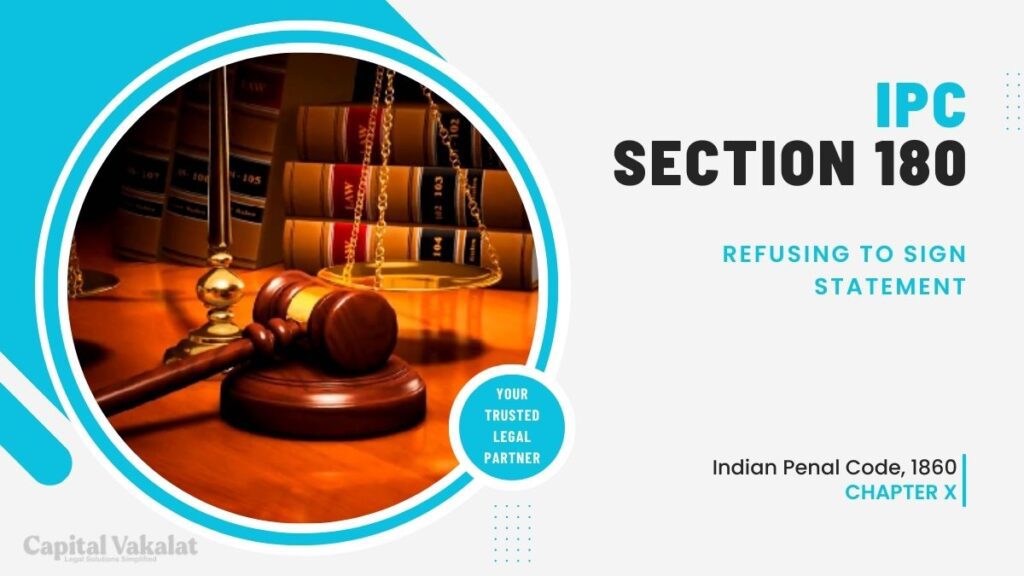Section 180 of the Indian Penal Code (IPC) is a crucial legal provision that pertains to the act of refusing to sign a statement. This section plays a significant role in the country’s legal system as it safeguards the rights of individuals accused of crimes and ensures the fair administration of justice.

In this article, we will delve into the intricacies of Section 180 IPC, exploring its implications, the consequences of refusing to sign a statement, and the legal procedures associated with it.
Understanding Section 180 IPC
Section 180 of the IPC is a legal provision that addresses the refusal to sign a statement in the context of criminal investigations. It acknowledges that an accused person cannot be compelled to sign any statement, which could potentially self-incriminate or jeopardize their legal position. This provision serves as a safeguard to protect the rights and interests of the accused.
Importance of a Signed Statement
In any criminal investigation, statements from the accused, witnesses, and other relevant parties play a pivotal role. A signed statement is considered a formal declaration of the facts and circumstances surrounding the case. It helps law enforcement agencies and the judiciary in understanding the case’s details, and it can be used as evidence during the trial.
Consequences of Refusing to Sign a Statement
Refusing to sign a statement does not automatically imply guilt. An accused person may refuse to sign a statement for various reasons, including fear of self-incrimination or lack of trust in the investigating authorities. However, the consequences of such refusal can have legal ramifications, including prolonged investigations and potential delays in the legal process.
Rights of an Individual Accused of a Crime
Section 180 IPC is aligned with the principles of justice and fairness. It emphasizes that no person can be compelled to make a statement that might be used against them in a court of law. This protection is in line with the fundamental rights guaranteed by the Indian Constitution.
Legal Procedures and Safeguards
When an accused person refuses to sign a statement, certain legal procedures come into play. The authorities must ensure that the individual’s rights are respected, and the investigation proceeds in accordance with the law. This includes ensuring the presence of legal counsel during questioning and adherence to due process.
How to Deal with a Statement Refusal
Law enforcement agencies need to exercise caution when dealing with statement refusals. It is essential to respect the rights of the accused and proceed in a manner that upholds the law while balancing the interests of justice.
Avoiding Self-Incrimination
One of the primary reasons for refusing to sign a statement is to avoid self-incrimination. Section 180 IPC recognizes the significance of this concern and provides legal safeguards to prevent individuals from making statements that could potentially harm their legal standing.
Case Studies Illustrating Section 180 IPC
To better understand the practical implications of Section 180 IPC, it is beneficial to explore real-life case studies where individuals have invoked this provision to protect their rights and interests.
The Role of Legal Counsel
Legal representation is essential in cases involving Section 180 IPC. A competent lawyer can guide the accused through the legal procedures, ensure their rights are upheld, and provide valuable advice on handling the situation.
Debunking Common Misconceptions
There are often misconceptions surrounding Section 180 IPC. This section will address some of the common misunderstandings and clarify its actual purpose and implications.
Public Perception and Section 180 IPC
The perception of Section 180 IPC in the public eye can greatly influence how it is implemented and its effectiveness in protecting the rights of the accused. This section will delve into the public’s understanding and awareness of this legal provision.
Recent Legal Reforms
In recent years, there have been legal reforms aimed at improving the application of Section 180 IPC. These changes are designed to further safeguard the rights of the accused and streamline legal processes.
The Need for Legal Awareness
Understanding one’s legal rights is paramount, especially when faced with a criminal investigation. Legal awareness and education are essential for individuals to protect themselves and navigate the legal system effectively.
Conclusion
Section 180 IPC is a vital component of India’s legal framework that ensures the protection of an accused person’s rights. While refusing to sign a statement is within an individual’s rights, it is crucial to be aware of the legal consequences and safeguards associated with this action.
Frequently Asked Questions
What should I do if I am accused of a crime and asked to provide a statement?
It is advisable to seek legal counsel and understand your rights before providing any statement.
Are there any exceptions to the right to refuse to sign a statement under Section 180 IPC?
Section 180 IPC generally protects the right to refuse to sign a statement, but there may be specific legal circumstances where exceptions apply.
How can legal reforms improve the application of Section 180 IPC?
Legal reforms can streamline the process, enhance safeguards, and ensure that the accused’s rights are protected more effectively.
Why is legal awareness important in the context of Section 180 IPC?
Legal awareness is essential for individuals to understand their rights, make informed decisions, and protect themselves during legal proceedings.